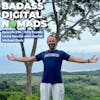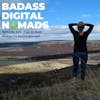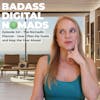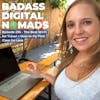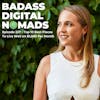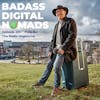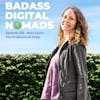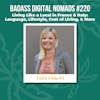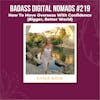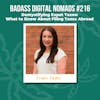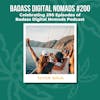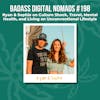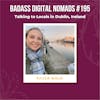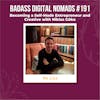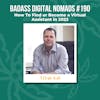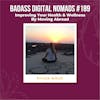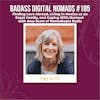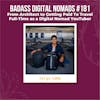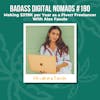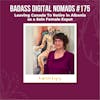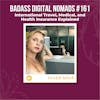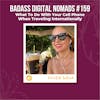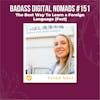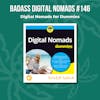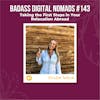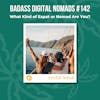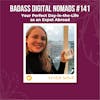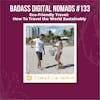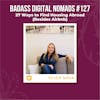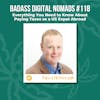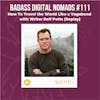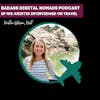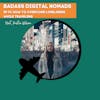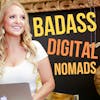Renouncing Your US Citizenship Part 1: Living Abroad in Canada With Erika Lind
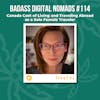
Erika Lind is a solo female traveler (and one of Kristin’s YouTube subscribers) who grew up in the United States but decided to renounce her US citizenship during the pandemic. Now based in Vancouver, Canada, she explains how she accomplished the feat of renouncing her US citizenship.
Erika Lind is a solo female traveler (and one of Kristin’s YouTube subscribers) who grew up in the United States but decided to renounce her US citizenship during the coronavirus pandemic. Now based in Vancouver, Canada, Erika agreed to come on Badass Digital Nomads to share her story on renouncing.
In part 1 of this interview, Kristin and Erika talk about what led her to renounce her US citizenship, her experience traveling solo abroad as a female, and why she chose to settle in Vancouver, Canada. She shares info on her cost of living and quality of life there, while she and Kristin also discuss how ancestry and your DNA could affect where you choose to travel or living abroad.
Erika also gives insight into the process of getting citizenship in Canada, explaining why it may be easier for some people and more difficult for others.
Have you ever considered renouncing your US citizenship and moving to Canada or another foreign country by yourself? If so, this podcast is for you.
And make sure to tune in for part 2 next week to learn more about the pros and cons of renouncing your US citizenship.
EPISODE 114 TOPICS DISCUSSED:
- Why Erika chose to live in Canada.
- Certain categories of Canadian citizenship.
- The cost of living, housing, and food in Canada.
- How Erika found a job abroad.
- How to get sponsored for Canadian citizenship.
- Erika’s experience moving to NYC alone at 21 and solo traveling the world as a female.
- The link between your DNA, your ancestry, and where you travel.
QUESTIONS ANSWERED:
- Is it hard to get Canadian citizenship?
- What do you love about living in Canada and why did you choose to live there?
- Is your job in Vancouver location-independent?
- How did you come across my channel and why do you enjoy travel/expat content?
- What European countries have you been to?
- And much more!
RESOURCES
Videos:
- Watch the video version of this interview (coming soon)
- Digital Nomads in Santorini, Greece [nomad cruise]
- Digital Nomad Cruise Day 6: Ancient Olympia Greece
- Nomad Cruise 6 Travel Vlog - Mediterranean Edition
- EXPAT EXPLAINS: Americans Abroad on Paying Taxes and Renouncing Citizenship
- 8 Reasons Why People LEAVE Costa Rica [Why I Left]
Podcasts:
- Insights from Meditating for 100 Hours in 10 Days
- Benefits of Meditation + Doing a 10-Day Silent Vipassana Course
- How U.S. Expats Feel About Paying Taxes Abroad and Renouncing Citizenship
- The Shocking Truth About How US Expats Vote
- Inside the Real Bangkok, Thailand with Erick Prince, The Minority Nomad (Part 1)
- Inside the Real Bangkok, Thailand with Erick Prince, The Minority Nomad (Part 2)
Articles:
- The Most Underrated Destinations for Digital Nomads (Canada is #1!)
- Summer Travel Destinations Around the World
Places to Visit in Vancouver:
Other Creators:
Learn About Your Ancestry:
Connect with Kristin:
- Follow on Instagram
- Subscribe to Traveling with Kristin on YouTube
- Subscribe to Digital Nomad TV on YouTube
- Follow on Medium
- Follow on Clubhouse @KristinWilson
- Join the Badass Digital Nomads Facebook Group
...........................................................................................
Support the Badass Digital Nomads Podcast:
- Buy Me a Coffee
- Become a Patron
- Leave a 5* Review: https://lovethepodcast.com/digitalnomad
- Buy Official Merch
- Search All Episodes: www.badassdigitalnomads.com
...........................................................................................
Thank you to my 2021 Patrons: Teklordz, Trader Walt, Shawn, Gary, Gary R, Yozhik, Bronwyn, Cynthia, Erick, Yasmine, Mike, Isaac, Michael, Scott, Karen, Erik, Heather, Craig, RZ, Timothy, Richard, Fred, Lakshay, Yohji, Annie, Ray, Ron, Henry, Kelly, Alejandra, Keith, Stephen, Eddy, Warren, James, Javier, and Daniel.
Warm welcome to my newest patrons, Gary Bridges and Emily A!
Become a Patron for $5/month at Patreon.com/travelingwithkristin
...........................................................................................
Podcast descriptions may contain affiliate links of products and services we use and recommend at no additional cost to you.
Sneak Peek:
Kristin: 00:00:00 These connections, they go deeper than this lifetime that we're in right now.
Erika: 00:00:05 Yeah. Up here kind of just feels comfortable. I dunno if I would even describe it as home because I don't really have a home. But up here just, you know, I feel safe and you feel comfortable and the, the culture and the, the way people are and the values with society are, I feel like, are in agreement with me. And they, they weren't in the US, Um, but up here it's, it's been pretty good.
Kristin: Yeah.
Introduction: Welcome to Badass Digital Nomads, where we're pushing the boundaries of remote work and travel, all while staying grounded with a little bit of old school philosophy, self-development, and business advice from our guests.
Kristin Wilson, Host: 00:00:50 Hi everyone. Kristin Wilson from Traveling with Kristin here and welcome to episode 114 of Badass Digital Nomads podcast. And welcome to part one of my interview with a YouTube subscriber named Erika Lind on why and how she renounced her US citizenship. In this episode, part one of our discussion, we're talking more about her background as in what led her to start thinking about renouncing her US citizenship. To begin with, we also talk about her experience solo traveling abroad as a female traveler and why she ended up choosing to live in Vancouver, Canada. We also talk about her cost of living there, her cost of housing, and even how she found her job. In part two. We'll dive into exactly the cost and details of renouncing your US citizenship, including why Erika decided to fly to Mexico to speed up the process. But in this episode, we're focusing on her lifestyle in Canada and her experience solo traveling abroad.
Kristin: 00:02:00 As a female, I was so inspired by Erika's strong sense of self and her commitment to her individuality and what she wants to do in the world. Super inspiring conversation. Hope you love it as much as I did. And make sure to tune in next week for part two where we go deep into the step-by-step process of why to renounce your US citizenship, the pros and cons and how. I also want to thank Danny Schleien from the United States for leaving a five-star review on Apple podcasts. He says, love the podcast. Kristin has a wealth of experience and insight gained from many years living and mastering the digital nomad lifestyle that translates into a great podcast that can help people who wanna pursue remote work, solo entrepreneurship, and becoming a digital nomad or really any sort of lifestyle with more freedom and excitement and less monotony and stagnation. Kristin has amazing guests, but also fantastic solo episodes. Awesome show. Highly recommend. Thanks Danny. And thank you to everyone who is out there listening and leaving reviews. Thanks again for your support and on with the show.
Podcast Interview:
Kristin: 00:03:19 Okay, Erika, Welcome officially to Badass Digital Nomads podcast. Where are you calling in from right now?
Erika: 00:03:27 I am in Vancouver, BC in Canada.
Kristin: 00:03:30 One of my favorite cities in the world. <laugh>, did you know that? No. <laugh>. How long have you been there?
Erika: 00:03:35 I've been here for about five years. My background is a little bit interesting. I was born and I grew up in Washington State, but my mother is Canadian so I have a lot of relatives that are from BC. Growing up, we would come up to Canada pretty frequently, even though I just moved to Vancouver five years ago. It doesn't really seem like a foreign place, if that makes sense. Like I was already familiar with it even before I finally moved up here. So I have like my dad's side of the family is from the US and then I have my Canadian relatives are up here.
Kristin: 00:04:05 Okay. So were you born with dual nationality or is this something Okay. Yeah,
Erika: 00:04:11 If you have a parent that's born in Canada, then you automatically get Canadian citizenship.
Kristin: 00:04:16 Okay. That's convenient. So you, that was one of my questions for later. Did you get another passport yet? But you already have one.
Erika: 00:04:23 Yeah, because it's, it's difficult to get Canadian like Canada. Canada is one of the most difficult countries to migrate into.
Kristin: 00:04:30 Yeah, Definitely. And one of the most expensive if you don't have high demand. Mm-Hmm. <affirmative> reason for being there, like uh, you're a skilled worker.
Erika: 00:04:38 Yeah. They have these programs with points where if you have college degrees and if you speak foreign languages and if you've got professional job experience, basically if you're like a higher quality or a credentialed working professional then it's easier to get in. But it's still no guarantee that just allows you to enter this lottery system and then they just like randomly draw from the pool and you might get invited to immigration.
Kristin: 00:05:01 <laugh>. Yeah, it's very high stakes and a lot of people don't know that. I've worked with poker players and sports bets and people in the gaming industry for 10 years and actually professional poker player is considered being an athlete in Canada. So you can qualify for Canadian either permanent residency or get on a path to citizenship through being a professional poker player athlete. Interesting. But the catch is you have to be one of the best in the world and you have to be able to prove that there's millions of poker players but not all of them can qualify that way. And Canada's one of our most popular destinations for US poker players and sports bets relocating because it's so close, so similar in culture speak English, but then it's difficult to stay more than six months or if you extend after you extend once it's pretty difficult to keep extending. You typically have to leave Yeah. And then come back in 180 days or even a year later depending on your status. And um, now with the pandemic it's been closed so we really haven't done any relocations to Canada since February of 2020 and that was our probably number one or number two destination with Costa Rica. But what are some of the things that you love about living in Canada and why did you choose Vancouver specifically? Was it because of your family ties there?
Erika: 00:06:26 Yeah, so my dad still lives in Washington State. I wanted to be in a part of Canada where I could visit him. So from here down to where he lives is maybe a three or four hour drive so I can go down on a weekend and my sister lives in Oregon on the coast and I have some aunts and uncles that, that still live down in Washington. So it seemed like of all parts of Canada to go to, that would be the easiest to still visit my US family members. And I'm really interested in skiing and use to the northwest like weather system. So like it seemed like it would be the closest part of Canada to the environment that I grew up in.
Kristin: 00:07:03 Yeah, ironically I was snowboarding in Whistler <laugh>. That was my last international destination before the pandemic. So I was en route to Europe from Canada to Florida, stopped in Miami for a couple months, which turned into a year <laugh>, um, because of the pandemic. But uh, yeah, that was my last trip. I spent New Year's eve of 2020 in Vancouver eating sushi at my favorite restaurant at Miku. And have you been there? Oh it's so good. We'll link to that in the show notes and um, yeah, then meditating. We can also link to those episodes. I did a few podcast episodes on my experience meditating for 10 days in British Columbia, but I've been going to Canada since 2013. But yeah, such a great place to base yourself and especially if you're from the Pacific Northwest, it's very close to the culture and then close geographically.
Erika: 00:07:58 Yeah. Like on the surface it looks quite similar to, you're used to the west coast of the United States.
Kristin: 00:08:04 Which area of the city are you in?
Erika: 00:08:07 I'm in if you know like South Burnaby kind the boundaries of Vancouver to uh, Burnaby and then Richmond is just a little bit to the south.
Kristin: 00:08:16 So, Well let's take advantage and get, get some information on your cost of living <laugh> because Canada is notorious for being one of the most expensive places to live in the world. And Vancouver specifically, one of the most expensive cities in the world. And living in downtown Vancouver, that's definitely the case. I lived in Yaletown a few times in Coal Harbor. But getting into the suburbs, even just south, like over the bridge to South Burnaby, it can be so much more affordable. Yeah. So can you give us a bit of context onto what your long-term cost of living is there as a local?
Erika: 00:08:48 So yeah, just before even touching on that, there are parts of Canada which that are really cheap to live in like if you're to say, oh Canada as a country is expensive, it's not all really expensive like Alberta and some of the interior provinces are quite cheap and some of the town--
Kristin: 00:09:03 and the border towns.
Erika: 00:09:05 Yeah. So, but yeah, Vancouver and Toronto are really expensive mainly in terms of housing. I have a pretty good deal. I live right on the border from Vancouver to Burnaby, which would probably be maybe 30 minutes drive to downtown if there's no traffic. And I have a one bedroom place and it's about 900 Canadian dollars. Really unheard of. I found this place through word of mouth through a friend that was living here. So you probably wouldn't find this deal if you like just went out onto Craigslist or
Kristin: 00:09:34 is it furnished?
Erika: 00:09:36 No. No.
Kristin: 00:09:37 Oh, okay.
Erika: 00:09:37 Yeah.
Kristin: 00:09:38 Well I found some in that price range in the suburbs but all long term like always one year rentals.
Erika: 00:09:45 Yeah. This was a one year and, but I've seen shared rental houses in Vancouver were just to rent a bedroom was like this much money or you know, a two bedroom downtown and they each have to pay a thousand or $1,500. So it's, I think it's like having a local connection really gives you a huge advantage just to finding places to live. 'cause people will be like, oh my friends moving out of their place and the landlords aren't gonna raise the rent. They just want like another good quiet tenant and Yeah. And so you can often get into these places before they even get listed onto the market but --
Kristin: 00:10:16 I had a Canadian friend literally renting a closet, a walk-in closet in someone's bedroom for 900 Canadian per month. Yeah. In Yaletown. I mean she just had this mattress in a closet <laugh>. And I mean that was absurd to me. I hope it wasn't that big either. I saw it. But that's where she wanted to be, you know, location, location, location and she's now living in the UK massive house. But yeah. And then for a year food expenses. So there's some really nice gourmet grocery stores around that area. What is your food budget and where do you go shopping?
Erika: 00:10:54 Yeah, I haven't really actually thought about it. <laugh>, which probably sounds bad.
Kristin: 00:11:01 That's good. And that means that you've got a It's affordable.
Erika: 00:11:04 Yeah. <laugh>, but let's see like I probably spend maybe like a hundred dollars a week on just groceries. I usually eat out for lunch at work and that ranges from maybe if like a cheap deli sandwich might be five or $6 or if we go out to like order from a nicer restaurant it might be $20. So it just kind of depends if you're gonna go out to eat like for dinner at a kind of like medium quality, like a good sit down restaurant, it would probably be maybe $20 for a decent appetizer. I mean, I'm sorry, $20 for like an entree and maybe $10 or $12 for an appetizer. And then if it was upscale steak or something like that, then it might be more on the $30, the $35 range. Yeah. But then consider that this is Canadian dollars too. Like if the audience is from the US and you figure you could take away a quarter. But since I've been living here, I don't even really think of the exchange rate. 'cause like well you, you live and get paid on Canadian dollars so what difference does it make with the US dollar is
Kristin: 00:12:02 <laugh>. Right. Exactly. Um, I even had a Canadian bank account. Canadian dollars. I pretty much spent everything in Canadian that I didn't have to exchange money anyway. Think about the exchange rate. And then are you a coffee lover?
Erika: 00:12:15 I do, yep. Yeah, I do have coffee.
Kristin: 00:12:18 What's your favorite, your favorite coffee shop? 'cause there's so many good ones there.
Erika: 00:12:21 I don't really go to coffee shops,
Kristin: 00:12:22 <laugh>. Oh, you drink at home?
Erika: 00:12:24 Yeah, so I, I, I work in a large office and so we have coffee machines and so I usually just have my coffee in the office. If I'm at home I'll just get, I like the Starbucks Pike Place roast, so I'll usually just get the grounds from that and then make, make it with the French press so.
Kristin: Oh, okay.
Erika: I actually almost never go out to a real coffee shop <laugh>, but I do drink coffee during the week. Yeah.
Kristin: 00:12:47 It's so tempting there though. I used to go to, there was a, I think a JJ Bean coffee shop next to my downstairs from my apartment and it was great. It had two stories so it was really good for working and I went there all the time and um, Wave coffee, there's so many good ones, but it gets really expensive to go out for coffee all the time. But --
Erika: 00:13:08 Yeah, like you could go and spend four or $5 each time you go out to a coffee shop and you know, I could buy a pound bag of grounds for maybe $10 and that would last me for like two weeks. So it's
Kristin: 00:13:20 <laugh>. Yeah. I saw a video with, I forget his name right now, I'll have to look him up and link in the show notes. He is like super famous YouTuber and he talks about how coffee, it only costs him two or 3 cents per cup to make it at home. And when you think of it that way, it sounds insane to actually buy a $4 cup of coffee <laugh>. That's the price of top of a bag, but it's part of the experience.
Erika: 00:13:45 I think part of it is the experience. Like if you need a place to work and you're maybe you're, you're traveling and you, you're traveling and you can go someplace where you can sit for a few hours and you can get wifi and you can use the washroom and you, you know. But for me, I don't need any of that experience because I have places hippy just from my own house or my, you know, workplace. So for me the experience is, is not really valuable.
Kristin: 00:14:07 And what do you do for work?
Erika: 00:14:09 So I'm a systems admin, uh, at a large manufacturing company. So it's a company that makes the circuit boards of all kinds of electronical products. And we have offices or manufacturing plants in Mexico and China and across the US and Canada. So I deal with a lot of the um, software services across the company.
Kristin: 00:14:30 Were you working from home during the pandemic or in the office?
Erika: 00:14:35 I was mainly going to the office. So we, we have an office that sort of adjoining to the manufacturing plant and at least the IT group was still going into the office so that we would be able to attend if there's any machines or if a computer breaks down and we had to go out and you know, replace something. So we would go in. But most of the office workers were working from home. Yep.
Kristin: 00:14:59 And how long have you been working there? Were you working there when you lived in the US as well?
Erika: 00:15:04 No, I've been here at this place for about two and a half years. Um, when I first moved up to Vancouver I was uh, working kind of more of a, um, help desk role at another tech company and I was there for about two years and then after that I moved over to where I am now.
Kristin: 00:15:20 Okay. And so just to clarify for the audience, you were able to get these jobs because you had citizenship already, so you didn't need any sort of work permit or documentation or anything?
Erika: Right.
Kristin: Okay.
Erika: 00:15:32 Yeah, They wouldn't have sponsored. It really depends on the job to get, to really get sponsored. You need to be in some kind of higher seniority level where maybe your expertise is so valuable that it couldn't be filled locally to get that through with the Canadian immigration is, yeah, really diff is really difficult. Most of the people that come in will apply for the express entry where the Canadian government just gives them a permanent residence status because they are credentialed enough to be a good quality immigrant. And so then once they get that, then they can just move in and and go and get a job. But I, I think if to come here without that and be sponsored by a company would probably be really difficult.
Kristin: 00:16:18 Yeah. And it's very strict. I am--had people that, they weren't my relocation clients, but they contacted me because they were turned away at the border for something and they, they couldn't get in. It's going to be really interesting to see how Canada reacts to this shift to remote work because you could get turned away for saying that you were working on your laptop and so many countries are doing these digital nomad visas and remote work visas. But I wonder if Canada will really jump on board with that or if they'll get stricter against remote workers that are just going to Canada to hang out and work online.
Erika: 00:16:57 I think 'cause I think that Canada looks at, well how will this immigrant contribute to the Canadian society? So like someone, I don't think that they're really placing a lot of value in just like having someone be here while they work for a remote company and then maybe they're gonna leave and go back home in two to five years. I, I think they're, they're looking for people that are gonna be paying into the tax system. They want people that are gonna stay and build their careers here and maybe get involved in in wherever because they do have, Canada does have a pretty negative birth rate I believe, and I know in the bigger cities a lot of people aren't having kids because it's so expensive. Um, or maybe they're just really like the cost of living is so high that you kind of have to be career-minded
Kristin: 00:17:37 Yeah.
Erika: 00:17:38 To exist in some of these places. And then if you are that kind of career-minded person, then maybe you're gonna be less interested in having a family. So I know that Canada takes in a lot of immigrants to sort of of offset that birth rate, but then it's like, okay, well we want someone that's gonna come and stay for the rest of their lives and who's gonna be paying into the tax system. So like, it may not be worthwhile for Canada just to have someone that's gonna come and work on their laptop and maybe they pay into the local economy, but they're not really paying into the tax system and then they're gonna leave after two years.
Kristin: 00:18:09 Right. And you know, I'm sure that Canada values tourism dollars, but it must be, I don't know it's the statistics offhand, but it must be a smaller part of GDP compared to countries like Costa Rica and Thailand. Yeah. And Indonesia where tourism is their bread and butter. Iceland comes to mind. So it, I don't think they have as big of an incentive to encourage remote workers. I haven't heard any whispers of a Canada remote work visa of any kind. Yeah. So I feel like they'll be one of the later adopters of that. And possibly when there is some certainty with regard to taxation or that might actually be a mandatory part of the visa is opting into the tax system the way that Estonia and Croatia and some other countries have it. If you stay a certain number of days, and given that in a lot of countries, if you stay more than 180 or 81 or 83 days, you can be considered a tax resident.
Kristin: 00:19:07 And knowing that US citizens, for example, can go to Canada with just a passport on a tourist visa for up to 180 days. I can see how if they, it wouldn't cost them that much to let remote workers come for one year because there's already an option to extend for another 180 days. If you can prove that you have enough money to be there <laugh>, that you're gonna be spending money and contributing. So I can see them allowing a one year visa, but with that condition of some sort of tax obligation or high fee, like a high income proof of income, whether it's 5,000, 7,000, 10,000, I don't know what it would be. But that'll be interesting to see in the next couple years.
Erika: 00:19:51 Yeah. I don't know what the real benefit to Canada would be though, because there are plenty of qualified immigrants that wanna get in with the express entry. Yeah. And there's, so yeah, I don't, it's not like they're a country that's like really desperate to get local economy
Kristin: Yeah.
Erika: Income from like, at least in Vancouver, I think most of the provincial tax revenue comes from real estate. It doesn't, you know, come from the sales tax of people going out to restaurants.
Kristin: 00:20:18 <laugh>. Yeah. And there are plenty of foreigners buying real estate in Canada too. So. And on that note, I, I was thinking I'll be doing some videos on Canada reopening and certainly if they make any mention of this, but, um, how did you end up coming across my videos and how did you get interested in this type of content on travel and living abroad?
Erika: 00:20:40 I watch a lot of YouTube and I like to watch the travel vlogs. I know there's one about a girl that lives in Iceland and she goes all over the place. And I'm also really into photography. So I like these YouTube channels where people that are really good quality content creators go around to these exotic countries and they've got their cameras and they film themselves being out at the beach and all <laugh> Yeah. Stuff like that. Yeah. I don't remember exactly when I came across your channel, but it's at some point it must have come up on, I, I am interested in travel and I like to be able to see some of these vlogs where you can kind of get an idea of what it's like to go to this place. Like more than just, you know, looking at photos of the city. Like there's a couple on YouTube that they travel around Mexico and they film themselves and they give you in local information about that particular area and they tell you how much the restaurant food costs and all this kind of stuff, so --
Kristin: 00:21:32 I think I watch that's Tangerine Travels.
Erika: 00:21:35 Yeah. I watch that. So to me it gives a lot of value because I can see, oh, maybe I would be interested in going to this place, uh, or no, maybe I wouldn't, but <laugh>
Kristin: 00:21:42 Yeah. It's funny that you say a couple in Mexico and their brand is so strong that I already know who you're talking about <laugh>. I wish that I had that, but that's not my personality. You know, my personality is to go to all these different countries and to have all these different platforms like video, podcast and all these different aspects. But I think that's the contribution I have.
Erika: 00:22:02 Yeah. I guess that just the expat a portion of it is interesting to me too because I left and I'm, although now I guess I wouldn't really be considered, are you still considered an expat if you have citizenship in the country that you're living in? <laugh>
Kristin: 00:22:16 I think you live in a gray area that is really interesting. You're probably one of the few people in the world that's like, you have dual citizenship and then you renounced and now you live in your sort of second home country, but now it's your primary home and you are a naturalized citizen, so, or born as a citizen there. Yeah. So it's, you get your own little niche there. So do you remember your first travel memory or when you first started getting interested in it? Because I, I read in your pre-interview that you moved by yourself to New York City at 21. So can you remember how far back this interest in travel started for you?
Erika: 00:22:54 I think I've always, even from a young age, I was pretty interested in kind of just going off on adventures and I remember being in high school where we would skip school and go off to the, the city for the day to just like wander around and go to coffee shops and walk around in parks and like see buildings and stuff like that. So even from an early age, I always kind of had that, that drive and wanting to just kind of go someplace. I never felt like attached to a place and not the place that I grew up in. So even after high school, I had worked for a couple of years and then I just wanted to go to New York City and like, but not for any real objective reason. Like, it wasn't like, oh, I'm going here to do this one specific thing.
Erika: 00:23:39 I kind of just wanted to leave and go there. And so I just kind of rented an apartment over the phone on Craigslist and saved up some money and then flew there with like nothing but a couple of suitcases. And I stayed there for about six years. Traveled and, let's see, I, I traveled all over the Northeast and New England areas and I've been to a lot of US states and um, but even there, I was there for about six years and then I kind of felt over it. I I kind of felt bored because I'd, I'd done everything that you would go to New York City to do. And so then it was no longer interesting to me anymore. So then after that I went to Chicago and I lived there for about four years. And then it was after that that I kind of had gotten a little bit older and, and decided, oh, maybe I'd like to find a place where I could just kind of stay.
Erika: 00:24:24 And that was when I eventually moved to Canada. But uh, even through that I've kind of always been interested in traveling. I've gone to Europe by myself a few different times where I would just fly to someplace and go on the trains or go to some area that I've never been to just by myself as like a exploration. And that was always fun to me. So I never, I guess it's kind of nomadic because I never felt attached to like my home, like where I grew up. Like those people that they just, they'd never leave and they buy a house near where in the town that they grew up in and they, I never really felt attached like that. So when I had the chance to come to Canada, like there was no sense of, oh, do I really wanna leave the us because I didn't feel any attachment to the US as if it was like my home or where I should stay.
Kristin: 00:25:11 I can definitely relate to that. I think a lot of people can, I mean right before we started recording we were talking about Eric's interview in Thailand and how he, uh, that's something that we talked about in that interview is how he didn't feel attached to his home even though he could live there in Cleveland, he felt like he had to find his place in the world.
Erika: 00:25:31 Yeah. Like, 'cause you could, there could be other places that you'll have a better life. So I thought, well, Canada has healthcare air is nice and clean and there's lots of mountains and there's, it's pretty safe. There's not that much, you know, so I'm kind of looking at what are the pros and cons like, so there wasn't any real reason why it would make sense for me to stay in the United States.
Kristin: 00:25:52 Yeah.
Erika: 00:25:53 So I, and I already had the citizenship so I just decided to leave <laugh> <laugh>.
Kristin: 00:25:58 So in high school you were traveling or you were exploring around in Seattle with your friends? I think a lot of people can relate to that too. Like kind of taking a half day of school or you know, after school going out around and exploring. And that was the same for me in Florida. And then to try to find where to go after graduating. And a lot of people can relate to buying a one-way ticket to California or New York or Chicago or something, you know, kind of leaving the small town or leaving one city for another. And I've talked about that as well in, in Costa Rica and my video about why I left Costa Rica. It's like after a certain number of years, I think this happens more times when you start traveling and living in different places earlier in life because you just have more trajectory to keep changing your mind about where you wanna live.
Kristin: 00:26:48 So even if it's not another country, even if it's going to New York or a different part of your country, to have that five to six to eight to 10 year period where you're living there, you've kind of seen it all done it all. And for me it was showing up on a beach in Dominical and having a flashback from 10 years earlier on the same beach with the same guy that I was surfing with. And he was a lifeguard. And I just felt like I was living Groundhog Day after a while, <laugh>. And so that's possible anywhere, even if it is a place that once was so interesting and so new and such a big adventure for you like New York. I mean the first time anyone goes to a place like New York or even Vegas or anything that you've seen in videos or photos, it's like so impressionable and the energy is so intense, but then yeah, you get used to it. And so I liked that you came to that decision and then you switched and went to another place. And then just for context, what are some of the countries that you went to in Europe?
Erika: 00:27:47 So I've been to, I'm interested in Sweden. My ancestry on my dad's side is Swedish and Scandinavian. So I've, I've been to Sweden a few times. I've been in Finland and I've been to Estonia and um, I haven't been to Norway. I think that's my next place I wanna go at least when the European travel opens up. Um, so yeah, I'm, it's kind of, I've gone to places that are far away, but there are also places that I felt like I had a connection to. Yeah. Or had a reason to go. And then I've also gone back repeatedly and then gone to the same places. <laugh>,
Kristin: 00:28:22 I did that too. You know, I wonder how much there is that we don't know that's going on subconsciously in our brains or in our DNA things that we've inherited these connections to places that are just not explained by science today. Yeah. Because many people, especially listening to this, are either native of this country that they have roots in or they're one generation removed from another country. Maybe if you're in the US maybe two generations, maybe three if your great-great grandparents or some of the first people to the first Europeans to immigrate over to the US And there's definitely this strong interest in those ancestral connections. And that explains the popularity in my view of why ancestry.com and these d tests that you can take in the mail are so popular. I mean, they must be because they're doing mainstream commercials that are the Super Bowl commercials.
Kristin: 00:29:22 You know, like they're spending so much money to advertise these things. So they must be selling so many of them. And the way that you went to Finland and Sweden and wanted to just explore that area first. I went to Italy first 'cause that's where my family's from and that's just where I was interested in going. And my grandmother was the last child to be the first child to be born in the us Her, her siblings were all born in Sicily. And so I think that resonates with a lot of people and that it's also a good starting point to travel. Like to start with your roots and go from there.
Erika: 00:29:59 Yeah. It was weird how like, going to Sweden, I just felt at home like maybe not like I know where all the places are, but I just had this feeling of comfort and like the way the Swedish culture is felt in agreement with my values. Um, so it felt like a comfortable place to go. And then I would go back and there'd be like maybe some park or some restaurant that I liked and then I would go back there when I, you know, went the next time. Each time I might travel to another part of Sweden or something like that. But, and I know my dad's relatives had come from there several generations back. So maybe there's some kind of connection <laugh>.
Kristin: 00:30:36 Yeah. That's amazing. I just got chills when you said that because I, I've had that feeling when I've been in Europe. I think that's why I've spent so much time in Europe because my family's from there. I've sprinkled my, uh, grandfather's ashes over the bridge and the Dan New River from the Chamber Bridge and Budapest. And it's just these connections, they go deeper than this lifetime that we're in right now. Yeah. And where we were born now.
Erika: 00:31:01 The same kind of thing with Canada. 'cause my mother's from here and her grandparents were from Canada. So like up here kind of just feels comfortable. I don't know if I would even describe it as home because I don't really have a home. Like my parents don't live in the houses that I grew up in, so there's no like home to go back to. But up here just, you know, I feel safe and you feel comfortable and the, the culture and the, the way people are and the values with society or I feel like are in agreement with me and they, they weren't in the US I just kind of felt like an uneasiness and I, I felt like I didn't really like how those systems were. And um, but up here it's, it's been pretty good.
Kristin: 00:31:42 Yeah. These are all really big green lights for people when they're traveling if they feel that sense of comfort and even if they can't really describe why they feel so comfortable there. And it's the same when you go to a place that just really doesn't resonate with you. And sometimes it takes time for that place to feel like home. I've referenced Athens a couple times in this sentiment because Athens was a place that I really strongly disliked when I got there. But then I got sick and I ended up staying for two weeks and by the end of the two weeks I had kind of found my rhythm in the city even though it wasn't a city that I instantly felt comfortable in. And then I kind of didn't wanna leave when it was time to go. Yeah. <laugh> with friends to the islands, to Santorini and then I kind of wanted to go back to Athens, but I was headed to Bulgaria at that point.
Kristin: 00:32:33 So it, it also sometimes you need to give a place more time and realize that you can learn to adapt anywhere but also, to really double down on the places that you feel like, wow, I really like this place. And then you extend and stay longer or go back and, and see more of it each time. And I think you're really gonna love Norway. That's probably my favorite country in that area. And I have some content that I still haven't published about it, but that'll come out soon. <laugh>. Okay. Well thank you for sharing all of that. It's so fascinating and I love hearing everyone that's listening to the podcast has their own life story that just is so interesting. So thanks for sharing with everybody. I'm sure a lot of other listeners can relate to what you shared. So let's talk about renouncing your citizenship. This is a question that it came up in a YouTube video I was doing on the US expat tax survey by Greenback Tax Services, who I have also had on the podcast now because of that survey. And you commented on the video and shared that you had renounced. So here you are on the podcast telling us about it. <laugh>, what led you to decide to renounce your citizenship? Why not just keep both?
Kristin: 00:33:50 I hope you enjoyed part one of my conversation with Erika Lind on why she renounced her US citizenship. Remember to tune in next week for part two, where we get into the details of exactly how the process went, how much it cost, the pros and cons, and even how she handled the reactions from her family and friends. We also have advice for others who are also considering renouncing your citizenship. And if she thinks that she'll ever change her mind on this decision someday.
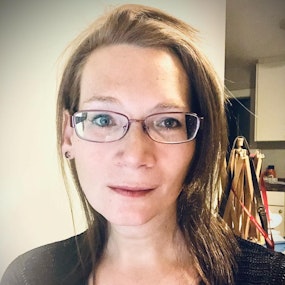
Erika Lind
Cloud Systems Administrator
Erika is a native of the pacific northwest who had a thirst for travel and adventure from a young age. After leaving home at 21 to move to NYC, she began a career in technology. Erika has since renounced her US citizenship to move to Vancouver, BC. She is also an avid female solo traveler who has been to Iceland, Sweden, Finland, and Estonia by herself.
Dismayed by the inconvenience and expense of US tax filing obligations for expats abroad, she decided to renounce her citizenship in 2021, solo traveling to Mexico during the pandemic to complete the process. She now lives happily ever after as a Canadian citizen in Burnaby, BC.


























